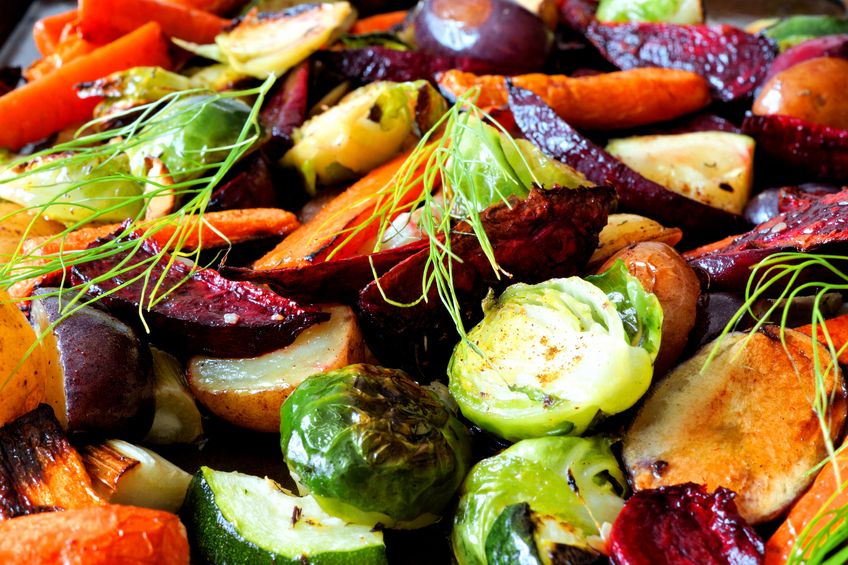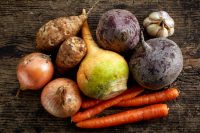Salads, although not essential for a healthy meal, do still make sense in winter! It’s an opportunity to try different ingredients than what you use in a summer salad.
Winter Salads: Rethinking Ingredients
Greens: Today’s grocery stores stock all types of lettuce year-round, so you don’t have to switch up your greens for winter. For more seasonal fun, however, try kale or the winter versions of spinach, which stand up well to hearty flavors. These greens are high in beta-carotene, lutein, and vitamin C, and spinach is a good source of the B vitamin folate that helps protect our DNA.

More Veggies: You can include winter vegetables beyond the usual leafy greens. And there are plenty of options from which to choose:
● Roasted vegetables are terrific in a salad. Cook double amounts of vegetables like winter squash, onions, Brussels sprouts and mushrooms, and use the extra in a salad another day. From beta-carotene to allyl sulfur compounds and other phytochemical, each is nutritionally valuable.
● Root and bulb vegetables, such as turnips, celeriac, fennel, and carrots, run from familiar to the unexpected. Turnips, a cruciferous vegetable, contain potentially cancer-protective phytochemicals. Add to salads steamed, roasted, or grated or sliced raw. Fennel adds a faint licorice-like flavor with its crunch, whether steamed, sautéed or sliced raw. Try roasting carrots to add a lovely depth of flavor.
● Boost a winter salad with year-round staple veggies. Make thinly sliced celery and radishes more than just a garnish. Radishes are also a cruciferous vegetable, and their red color reflects their content of anthocyanin flavonoids. Low-calorie crunchy celery provides a flavonoid phytochemical called apigenin known for anti-inflammatory and anticancer properties.
Legumes: Lentils combine well with both leafy greens and roasted vegetables for a higher protein salad. And black beans, thawed frozen corn, and red pepper create a colorful southwest-inspired salad. Legumes add fiber that protects against colorectal cancer and nurture a healthy gut microbiota and are a good source of folate.
Nuts and seeds: Get your crunch from foods that provide protein, healthy types of fat and vitamin E-related tocopherol compounds. Nuts also contain polyphenol compounds which show antioxidant, anti-inflammatory, and cancer-inhibiting effects.
Fruits: Oranges (or grapefruit) segments combine with raw spinach for a classic winter salad. Pears, especially winter varieties like Green or Red Anjou, are delicious in a salad raw or briefly sautéed or broiled. Grapes, apples, and kiwifruit add color and a sweet note to winter salads.
Whole Grains: Add heartiness and boost fiber and nutrients by including some cooked whole grains. Many people love tabbouleh, the bulgur-tomato summer salad. Bring the concept to winter: Cook a double batch of quinoa, brown rice, farro, kasha, sorghum or millet, use some for a salad and save the rest for later as a side dish or casserole ingredient.
No, salads aren’t essential to a nutritious meal. You can also boost portions of vegetables and fruits in other dishes like soups, stews or casseroles. Have fun experimenting with adding vegetables to your winter favorites!
# # #
AICR HealthTalk is by Karen Collins, MS, RDN.
Karen Collins, MS, RDN, CDN, is AICR’s Nutrition Advisor. Karen is a speaker, writer and consultant who specializes in helping people make sense of nutrition news. You can follow her blog, Smart Bytes®, through her website and follow her on Twitter @KarenCollinsRD and Facebook @KarenCollinsNutrition.






